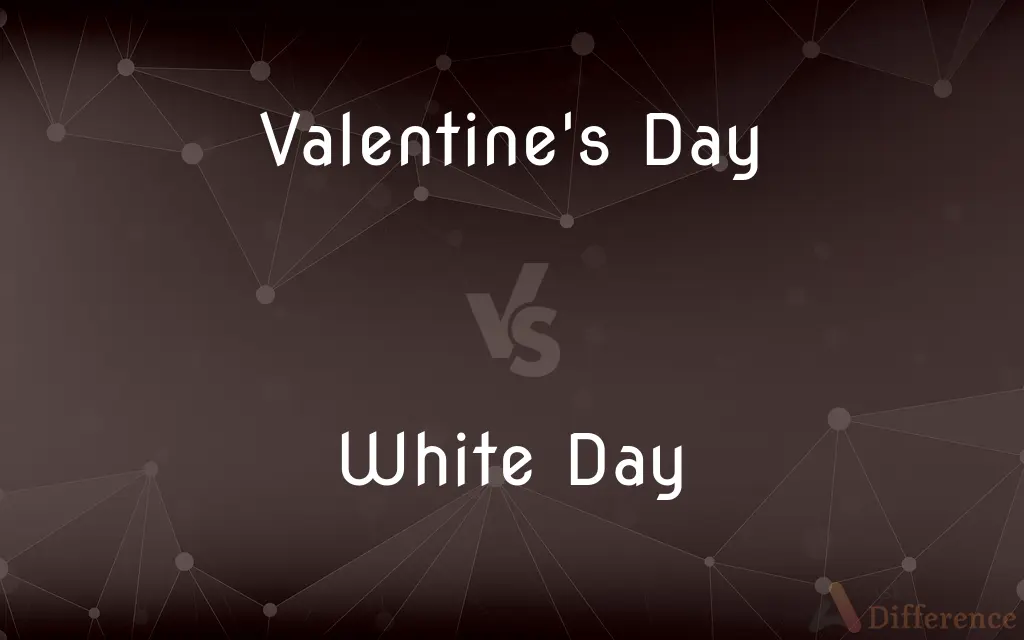Valentine's Day vs. White Day — What's the Difference?
By Tayyaba Rehman & Urooj Arif — Published on February 13, 2024
Valentine's Day, on February 14th, is when people express love, often with red-themed gifts. White Day, on March 14th, is a response, typically with white gifts.

Difference Between Valentine's Day and White Day
Table of Contents
ADVERTISEMENT
Key Differences
Valentine's Day and White Day are both celebrations of love, but they have distinct customs and origins. Valentine's Day, celebrated on February 14th, is a Western tradition where people express their affection through gifts like chocolates, flowers, and cards, often emphasizing the color red to symbolize love and passion. White Day, observed on March 14th in countries like Japan, South Korea, and Taiwan, serves as a complement to Valentine's Day, with the norm being that individuals reciprocate the affection they received on Valentine's Day, typically through gifts that are white in color, such as white chocolate, marshmallows, or jewelry.
The tradition of Valentine's Day involves a broad spectrum of celebratory practices, from romantic dinners to heartfelt gestures, encapsulating a universal appeal to express love and affection towards partners, family, and friends. White Day, on the other hand, was conceived as a marketing strategy in the late 1970s in Japan and has since evolved into a cultural tradition where men are expected to return the favor to the women who gave them gifts on Valentine's Day, often at a higher value.
While Valentine's Day has a long history dating back to ancient Roman festivals and Christian martyrs named Valentine, White Day was established more recently and is primarily celebrated in East Asian countries. The contrast in their origins reflects the diverse ways love and affection are recognized and celebrated around the world. Valentine's Day has become a global phenomenon, widely recognized and celebrated in various forms, while White Day remains a unique cultural observance with a specific regional footprint.
One interesting aspect of these celebrations is how they highlight the cultural differences in expressing love and gratitude. Valentine's Day's focus on mutual exchange and expression of love contrasts with White Day's emphasis on reciprocation and the societal expectation for men to acknowledge the gestures made towards them on Valentine's Day. Both days, however, underscore the importance of showing appreciation for loved ones in our lives.
In conclusion, Valentine's Day and White Day serve as two distinct, yet interconnected occasions to celebrate love and affection. Valentine's Day offers an opportunity for all individuals to participate in the act of giving, while White Day provides a platform for reciprocation, enhancing the cycle of gratitude and appreciation in relationships. Together, they encapsulate the multifaceted nature of love and the various ways it can be expressed and acknowledged.
ADVERTISEMENT
Comparison Chart
Date
February 14th
March 14th
Origin
Western tradition with ancient Roman and Christian roots
Originated in Japan as a marketing strategy
Primary Participants
Everyone is encouraged to express love and affection
Men reciprocate to women who gave them gifts on Valentine's Day
Typical Gifts
Chocolates, flowers, cards, often red-themed
White-themed gifts like white chocolate, marshmallows, jewelry
Cultural Significance
Global celebration of love and affection
Primarily celebrated in East Asian countries
Compare with Definitions
Valentine's Day
Marked by the exchange of chocolates, flowers, and cards.
I received a heart-shaped chocolate box on Valentine's Day.
White Day
Focused on gifts like white chocolate, jewelry, and marshmallows.
He chose a box of white chocolates for White Day.
Valentine's Day
A global celebration occurring annually on February 14th.
Valentine's Day brings people together in the celebration of love.
White Day
Celebrated a month after Valentine's Day, on March 14th.
White Day is the time to return the favor to your Valentine.
Valentine's Day
A day to celebrate romantic love with gifts and gestures.
He surprised her with a bouquet on Valentine's Day.
White Day
A cultural tradition in East Asian countries like Japan and South Korea.
White Day is as eagerly anticipated as Valentine's Day in Japan.
Valentine's Day
An occasion for expressing affection towards loved ones.
Valentine's Day is perfect for telling your family how much you love them.
White Day
Originated in Japan as a marketing invention in the 1970s.
White Day was created by a confectionery company to boost sales.
Valentine's Day
Often symbolized by the color red, representing love and passion.
The city was adorned in red decorations for Valentine's Day.
White Day
A day when men reciprocate Valentine's Day gifts, typically with white items.
On White Day, he gave her a beautiful white scarf in return.
Common Curiosities
Why is White Day celebrated?
White Day serves as an opportunity for men to return the affection shown to them on Valentine's Day, enhancing the cycle of giving and appreciation in relationships.
What is White Day?
Celebrated on March 14th in East Asia, White Day is when men reciprocate the Valentine's Day gifts they received, often with white-themed presents.
What distinguishes White Day gifts?
White Day gifts are typically white, such as white chocolate, marshmallows, or even jewelry, to adhere to the day's thematic color.
What is Valentine's Day?
It's a global celebration on February 14th, dedicated to expressing love and affection through gifts and gestures.
How did Valentine's Day originate?
Its origins are a blend of ancient Roman festivals and the honoring of Christian martyrs named Valentine.
What are typical Valentine's Day gifts?
Common gifts include chocolates, flowers, and cards, often featuring red to symbolize love.
When did White Day start?
White Day began in the late 1970s in Japan as a marketing initiative by confectionery companies.
Are there specific foods associated with White Day?
Yes, white chocolate and marshmallows are particularly popular, aligning with the day's white theme.
Is White Day exclusive to Japan?
While it started in Japan, White Day is also celebrated in other East Asian countries like South Korea and Taiwan.
Can women give gifts on White Day?
Traditionally, White Day is for men to give gifts; however, modern practices vary and can include gift exchanges regardless of gender.
Is Valentine's Day celebrated worldwide?
Yes, Valentine's Day is recognized and celebrated in many countries around the world, each adding its cultural touch.
Can Valentine's Day gifts be non-traditional?
Absolutely, while traditional gifts are common, many opt for personalized or unconventional gifts to express their love.
What's the significance of the color white on White Day?
White is chosen to symbolize purity and innocence, contrasting with Valentine's Day's red, which represents passion and love.
How has the perception of White Day changed over time?
Initially a marketing strategy, White Day has evolved into a significant cultural event in East Asia, with its own customs and traditions.
Do all cultures celebrate Valentine's Day in the same way?
No, the celebration of Valentine's Day varies widely across cultures, with some emphasizing romantic love and others focusing on friendship and family affection.
Share Your Discovery

Previous Comparison
Awards vs. Rewards
Next Comparison
QC15 vs. QC3Author Spotlight
Written by
Tayyaba RehmanTayyaba Rehman is a distinguished writer, currently serving as a primary contributor to askdifference.com. As a researcher in semantics and etymology, Tayyaba's passion for the complexity of languages and their distinctions has found a perfect home on the platform. Tayyaba delves into the intricacies of language, distinguishing between commonly confused words and phrases, thereby providing clarity for readers worldwide.
Co-written by
Urooj ArifUrooj is a skilled content writer at Ask Difference, known for her exceptional ability to simplify complex topics into engaging and informative content. With a passion for research and a flair for clear, concise writing, she consistently delivers articles that resonate with our diverse audience.













































